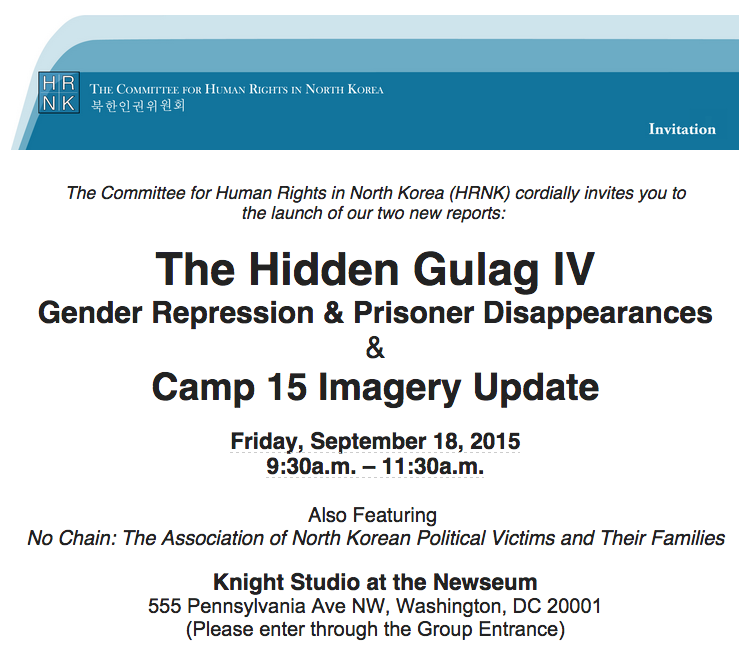|
“The Hidden Gulag IV: Gender Repression and Prisoner Disappearances” is an investigative and revealing report that examines discoveries regarding gender repression and prisoner double disappearances in the political prison camps of North Korea. The “Imagery Analysis of Camp 15 ‘Yodok’ Closure of the Revolutionizing Zone” features updated satellite imagery analysis of one of the political prison camps in North Korea, Camp 15. HRNK and AllSource Analysis worked closely together to discover the closure of the “Revolutionizing Zone.” David Hawk and Joseph S. Bermudez Jr. gave an in-depth overview of their findings, which was followed by a detailed conversation delving into these new developments and understandings of activities within North Korea.
David Hawk is a Visiting Scholar at the Columbia University Institute for the Study of Human Rights, and teaches at Hunter College, City University of New York. He is also a prominent human rights researcher and advocate and former Executive Director of Amnesty International USA, and a former United Nations human rights official. Hawk began directing AIUSA in 1974 and later served on the Board of Directors of AIUSA. Eventually he became a founding member of the Board of Directors of Human Rights Watch / Asia. As early as 1981 Hawk kicked off ground breaking investigations, documentation, and analysis on ongoing crises such as the Khmer Rouge genocide, the genocidal massacres in Rwanda in 1995, and most recently the grievous situation of human rights in North Korea. During the 1990s Hawk directed the Cambodia Office of the UN High Commissioner of Human Rights and in 1999 he returned to the USA to consult for the Washington DC-based Landmine Survivors Network.
Joseph S. Bermudez Jr. is an internationally recognized analyst, consultant, award winning author and lecturer on North Korean defense and intelligence affairs and ballistic missile development in the Third World. He is Chief Analytics Officer and co-founder of AllSource Analysis, Inc., and has served as senior all-source analyst for DigitalGlobe’s Analysis Center, senior analyst, editor and author for HIS Jane’s (formerly the Jane’s Information Group) and is the publisher and editor of KPA Journal. For the past two years he has served as the satellite imagery advisory to the Committee for Human Rights in North Korea (HRNK) and in that capacity has authored numerous reports for the committee.
Roberta Cohen is a Non-Resident Senior Fellow in Foreign Policy Studies of the Brookings Institution, specializing in human rights and humanitarian issues. She co-founded and co-directed the Brookings Project on Internal Displacement, served as Senior Adviser to the Representative of the UN Secretary-General on Internally Displaced Persons (1994-2010), and co-authored the first major study on the subject, Masses in Flight (Brookings, 1998). For her work ion internal displacement, she was co-winner of the Grawemeyer Award for Ideas Improving World Order. As concerns North Korea, Cohen has co-chaired the Committee for Human Rights in North Korea since 2011, has published a series of widely quoted articles and op-eds in major journals and newspapers, and has addressed major audiences. Earlier, she served on US Delegations to the Organization for Security and Cooperation in Europe, the UN General Assembly and the UN Commission on Human Rights, served as a Deputy Assistant Secretary of State for Human Rights in the State Department’s first human rights bureau, and as a consultant to the United Nations High Commissioner for Refugees (UNHCR), the World Bank, and NGOs. She is a member of the Committee on Conscience of the Holocaust Memorial Museum, a Senior Fellow at Georgetown University’s Institute for the Study of International Migration and an Adjunct Associate Professor at American University’s Washington College of Law. She has an Honorary Doctorate in Law from the University of Bern, an MA with distinction from the Johns Hopkins School of Advanced International Studies and a B.A. in History from Barnard College.
Gwang-il Jung is a North Korean defector and former political prisoner. He spent most of his youth in the military and trade sectors while in North Korea, but was arrested in 1998 for “espionage” and sentenced to work at the Yodok Political Prison Camp in 2000. He was eventually released and soon escaped North Korea to live in South Korea, where he worked for Free the NK Gulag (FNKG) and established No Chain in 2013. Through his organization, Jung actively smuggles movies, Korean dramas, and entertainment on DVDs and USB thumb drives into North Korea. Jung has also testified in front the European Union and U.S. Congress about the human rights abuses carried out by the North Korean government. He played a key role in the UN Commission of Inquiry’s investigation into the DPRK’s human rights violations.
Greg Scarlatoiu is Executive Director of the Committee for Human Rights in North Korea (HRNK) in Washington, D.C. He was formerly Director of Public Affairs and Business Issues of the Korea Economic Institute (KEI) in Washington, D.C. He has eighteen years of Korean and English language broadcasting experience for TV and radio stations including Radio Free Asia, Korea Broadcasting System, Hyundai Broadcasting System and Arirang TV. For eleven years, he has been authoring and broadcasting the weekly Scarlatoiu Column to North Korea, for Radio Free Asia. He has over six years’ experience in international development consulting, having delivered field technical assistance under missions funded by USAID, the World Bank and the Asian Development Bank. He has conducted eleven annual surveys of compliance with International Labor Organization (ILO) core Conventions in the Republic of Korea. He holds a Master of Arts in Law and Diplomacy (MALD) from the Fletcher School, Tufts University; and an MA and BA from Seoul National University, Department of International Relations.






